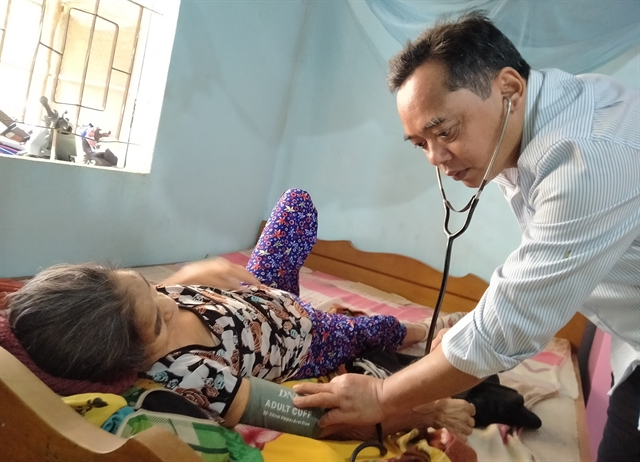 Society
Society

Over the past 20 years, after finishing work Mấu Văn Phi usually drives his old motorbike to offer medical check-ups and treatment to impoverished people, mostly of the Raglai ethnicity, in Khánh Vĩnh District in the central province of Khánh Hòa.

|
| Doctor Mấu Văn Phi measures blood pressure for 95-year-old Cao Thị Linh who resides in Liên Sang commune in Khánh Hoà Province’s Khánh Vĩnh District. — VNA/VNS Photo Thanh Vân |
Thanh Vân
KHÁNH HÒA — Over the past 20 years, after finishing work Mấu Văn Phi usually drives his old motorbike to offer medical check-ups and treatment to impoverished people, mostly of the Raglai ethnicity, in Khánh Vĩnh District in the central province of Khánh Hòa.
He often carries two big bags. One is filled with medicine to cure common ailments such as headaches, while the other contains basic tools for medical examination including a stethoscope, blood pressure monitor and scissors.
Although Phi is now Secretary of Khánh Vinh District’s Party Committee, he still spends his free time helping others.
Cao Thị Xì Tín, a resident of Liên Sang Commune, said her husband had suffered a stroke while she often faced pneumonia.
Despite having health insurance cards they don’t want to go to the hospital for treatment as there is no one else to take care of their house, crops and grandchildren. They have been treated by Phi for about four years now.
“Thanks to doctor Phi, who regularly visits, my husband's and my health is getting better. My husband now can walk,” Tín said.
Ninety-five-year-old Cao Thị Linh is another of his patients.
Though she has suffered from heart disease for many years, she doesn’t want to be hospitalised.
Cao Thị Sáu, Linh’s daughter, said she was grateful to doctor Phi who has treated her mother for a long time, adding that he also gave her medicine free of charge.
“Every time she has a fever or feels tired, I call him.”
“Doctor Phi also tells us to go to see the doctor when we are sick and not to believe in superstitions,” Sáu said.
Khánh Vĩnh District is home to 15 ethnic minority groups and the Raglai people account for 48 of the population.
Seeing the tough living conditions in the area, Phi decided to do something to help local residents and studied hard to become a doctor.
He was an excellent pupil during his 12 years of education and his efforts paid off when he passed the entrance exams to the Central Highlands Medical University.
In 1997, after graduating, Phi was assigned to work at Khánh Vĩnh District’s health centre, becoming the district’s first Raglai doctor.
Six years later, he was appointed as deputy director of the centre. Then he was elected as vice-chairman of the district’s People’s Committee in 2005 and deputy secretary and secretary of district’s Party Committee in September and October last year.
Despite his political commitments, Phi always uses his spare time to treat poor people who are ill. His patients mainly suffer from malnutrition, diarrhoea, respiratory diseases and chronic conditions.
“Offering check-ups after I’ve finished my office work has become a habit and I have a strong desire to do the work,” Phi said.
He said he wanted every citizen to be healthy and equipped with medical knowledge to take care of themselves.
“At first, I offered medical examinations and treatment to serve the people. Then, I wanted to promote the role of a Party member.
“Party members must be close to the people and listen to the people so that it is easier to convince them when it is necessary,” he said.
Talking about Phi, Nguyễn Tấn Tuân, chairman of Khánh Hòa Province’s People’s Committee, said he has become the pride of the local Raglai ethnic group.
As the secretary of the district, he has nurtured many plans to improve the living conditions of local ethnic minority people and has never forgot his responsibility as a doctor.
“Phi acts as a motivation for many young people in the mountainous district to have aspirations, studying hard to have jobs and serve their homeland," he said. VNS




